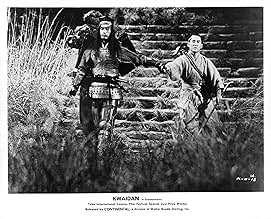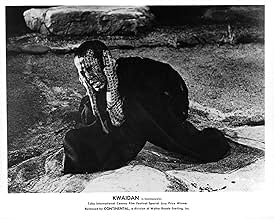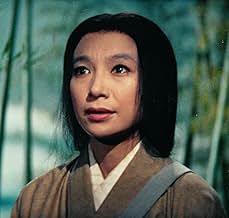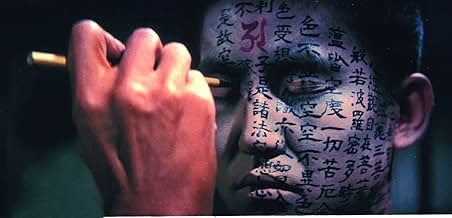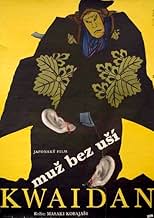NOTE IMDb
7,9/10
22 k
MA NOTE
Une collection de quatre contes folkloriques japonais avec des thèmes surnaturels.Une collection de quatre contes folkloriques japonais avec des thèmes surnaturels.Une collection de quatre contes folkloriques japonais avec des thèmes surnaturels.
- Réalisation
- Scénario
- Casting principal
- Nommé pour 1 Oscar
- 5 victoires et 3 nominations au total
Avis à la une
Kwaidan is one of the great underappreciated films: no one's heard of it, but you'll never, ever forget it once you've seen it. Parts of it may seem slow to some viewers, and most of the stories are extremely predictable, but I have to say this is one of the most beautiful, haunting movies I've ever seen.
Of all the stories I prefer "Black Hair," the first one. Though a rather pointless horseback archery scene just slows it down, it's by far the scariest and most nightmare-worthy of the stories, using sound to incredibly chilling effect. There's more terror in the last minute of this segment than in all three Scream movies put together. Trust me, if you consider yourself a serious fan of horror cinema, you have to see this.
The second story, "The Woman of the Snow," is good, though I wish it ended more like "Black Hair" (you'll see what I mean). "Hoichi the Earless," with its jaw-dropping sea battle sequence, is by far the biggest and most popular of the stories. It's also the most influential, with its main premise prominently re-used in Conan the Barbarian. The film ends with "In a Cup of Tea." This is the only story that doesn't completely telegraph its ending, and coming after three utterly predictable stories, its complexity is a bit unexpected and disorienting. Certainly it's as creepy and beautiful as the rest of the film, but I have to admit I don't really understand it.
Being a tremendous fan of elegant, understated horror movies, as well as a student of Japanese culture, I consider this film one of my all-time favorites. Granted, some viewers may be turned off by the leisurely pace and the theatrical, intentionally unrealistic sets. But this is undeniably a beautiful and chilling film, absolutely perfect to watch late at night, alone, in the dark.
Of all the stories I prefer "Black Hair," the first one. Though a rather pointless horseback archery scene just slows it down, it's by far the scariest and most nightmare-worthy of the stories, using sound to incredibly chilling effect. There's more terror in the last minute of this segment than in all three Scream movies put together. Trust me, if you consider yourself a serious fan of horror cinema, you have to see this.
The second story, "The Woman of the Snow," is good, though I wish it ended more like "Black Hair" (you'll see what I mean). "Hoichi the Earless," with its jaw-dropping sea battle sequence, is by far the biggest and most popular of the stories. It's also the most influential, with its main premise prominently re-used in Conan the Barbarian. The film ends with "In a Cup of Tea." This is the only story that doesn't completely telegraph its ending, and coming after three utterly predictable stories, its complexity is a bit unexpected and disorienting. Certainly it's as creepy and beautiful as the rest of the film, but I have to admit I don't really understand it.
Being a tremendous fan of elegant, understated horror movies, as well as a student of Japanese culture, I consider this film one of my all-time favorites. Granted, some viewers may be turned off by the leisurely pace and the theatrical, intentionally unrealistic sets. But this is undeniably a beautiful and chilling film, absolutely perfect to watch late at night, alone, in the dark.
There's a good bit of discussion of this film as "horror"; may I suggest that it's horrific in the sense of the ancient Greek tragedies. There's no attempt to coerce your Hollywood-abused adrenals into delivering just one more squirt by means of some in-your-face special effect. In fact, for each of these slowly developed stories, once you've understood the premise, the story will unfold pretty much as you've guessed it must, inexorably, relentlessly. The ghosts aren't there to "spook" us, they're to show us our common human spiritual and emotional failings. The horror of a ghost wife, for instance, isn't that her chains drag noisily across the the hardwood parquet floor, but that we've created her by our insensitivity, our misplaced values, or our betrayals.
The visual style is stupendous! The action takes place in a disappeared, iconic world of classical medieval Japan, perfect, and admitting no trace of the reality of modern times. Overlaid is a European Expressionist color sensibility, with emotionally charged color displacements of sky and skin, as if Hokusai and Ernst Ludwig Kirchner had been working cooperatively on the sets and lighting.
This is a wonderful movie. Please ignore attempts to fit it into some box, some genre. Rather look at it as a mature work of art, which happens to choose old Japanese ghost stories as its starting point.
The visual style is stupendous! The action takes place in a disappeared, iconic world of classical medieval Japan, perfect, and admitting no trace of the reality of modern times. Overlaid is a European Expressionist color sensibility, with emotionally charged color displacements of sky and skin, as if Hokusai and Ernst Ludwig Kirchner had been working cooperatively on the sets and lighting.
This is a wonderful movie. Please ignore attempts to fit it into some box, some genre. Rather look at it as a mature work of art, which happens to choose old Japanese ghost stories as its starting point.
The words "beautiful", "lyrical" and "evocative" aren't ones that you would normally attribute to a horror movie, but they are precisely the ones that best describe Kwaidan, a quintet of Samurai Gothics based (interestingly enough) on the writings of an American author by the name of Lafcadio Hearn. Shot in gorgeous, sumptuous color way back in 1964 by director Masaki Kobayashi, Kwaidan is an unusual, unique and quite extraordinary entry in the old horror anthology genre best represented by 1945's Dead of Night and Milton Subotsky's Amicus anthology series (i.e. Dr. Terror's House of Horrors, Tales From the Crypt & Asylum).
Kwaidan differentiates itself from the pack in a number of significant ways. To begin with, all of the episodes eschew the usual O. Henry "twist" endings and deliberately telegraph their punches, case in point being "Hoichi the Earless", which gives away its climax with its very title! This film is also missing the compulsory "wrap-around" story normally employed by anthology films to tie all the stories together, and the horror elements are far more low-key than most horror aficianados are used to. Kwaidan is far less concerned with springing shocks and fraying nerves than it is in exploring the whirlwind of conflicting emotions that swirl in the dark night of the human soul.
"The Black Hair" is the tale of an impoverished samurai who abandons his loyal and loving wife to marry the daughter of a wealthy lord in another province, only to discover many years later that he is still in love with his first spouse. He returns to their decaying old house to find her exactly as he left her, affectionate and forgiving as could be. You know something in this household just ain't right. "The Woman in the Snow" concerns an apprentice woodcutter who encounters an eerily beautiful female ice-vampire - called a "Yuki-Onna - who spares his life on the condition that he never tell a soul about their encounter. (If you saw the last episode of the flaccid Tales From the Darkside movie, on which this was based, you have an idea of how this one ends).
"Hoichi the Earless", easily the most powerful of the bunch, regards a blind biwa (a stringed instrument resembling a guitar) player renowned for his moving rendition of the tragic tale of the battle between the Genji and Heiki clans. Each night he is summoned to the nearby graveyard to chant the epic tale for the ghosts of the warriors who fell in that battle, duped by the spirits into believing that he's performing in the home of a wealthy lord. When Hoichi disocvers that he has been decieved by the dead and refuses to perform for them again, the ghosts exact a terrible revenge.
A note of warning to those deterred by long foreign films: this shimmering jewel in Japanese cinema's crown clocks in at nearly three hours of length and is, of course, fully subtitled. Visually bold, rich and color and texture, and atmospherically photographed with a spine-tingling elegance, I can't guarantee that you'll like Kwaidan, but I think that I can safely assure you'll never forget it. Highly recommended, especially for Japanophiles and those with a taste for high class horror.
Kwaidan differentiates itself from the pack in a number of significant ways. To begin with, all of the episodes eschew the usual O. Henry "twist" endings and deliberately telegraph their punches, case in point being "Hoichi the Earless", which gives away its climax with its very title! This film is also missing the compulsory "wrap-around" story normally employed by anthology films to tie all the stories together, and the horror elements are far more low-key than most horror aficianados are used to. Kwaidan is far less concerned with springing shocks and fraying nerves than it is in exploring the whirlwind of conflicting emotions that swirl in the dark night of the human soul.
"The Black Hair" is the tale of an impoverished samurai who abandons his loyal and loving wife to marry the daughter of a wealthy lord in another province, only to discover many years later that he is still in love with his first spouse. He returns to their decaying old house to find her exactly as he left her, affectionate and forgiving as could be. You know something in this household just ain't right. "The Woman in the Snow" concerns an apprentice woodcutter who encounters an eerily beautiful female ice-vampire - called a "Yuki-Onna - who spares his life on the condition that he never tell a soul about their encounter. (If you saw the last episode of the flaccid Tales From the Darkside movie, on which this was based, you have an idea of how this one ends).
"Hoichi the Earless", easily the most powerful of the bunch, regards a blind biwa (a stringed instrument resembling a guitar) player renowned for his moving rendition of the tragic tale of the battle between the Genji and Heiki clans. Each night he is summoned to the nearby graveyard to chant the epic tale for the ghosts of the warriors who fell in that battle, duped by the spirits into believing that he's performing in the home of a wealthy lord. When Hoichi disocvers that he has been decieved by the dead and refuses to perform for them again, the ghosts exact a terrible revenge.
A note of warning to those deterred by long foreign films: this shimmering jewel in Japanese cinema's crown clocks in at nearly three hours of length and is, of course, fully subtitled. Visually bold, rich and color and texture, and atmospherically photographed with a spine-tingling elegance, I can't guarantee that you'll like Kwaidan, but I think that I can safely assure you'll never forget it. Highly recommended, especially for Japanophiles and those with a taste for high class horror.
10FieCrier
This is one of my favorite horror films, and I daresay one of my favorite films in general as well. Anyone who doubts that a horror film can be great art as well ought to give this one a try.
I will have to revisit this comment after viewing the film again, as it has been a while, but there were a few comments I thought people might find useful regarding the stories the film adapted.
Two of the stories can be found in Lafcadio Hearn's book Kwaidan: Stories and Studies of Strange Things. These are "Hoichi the Earless" ("The Story of Mimi-nashi-Hôïchi") and "The Woman in the Snow" ("Yuki-Onna"). The other two can be found in other books of Hearn's; I'm grateful to Kenji Inadomi for pointing out that "Black Hair" can be found as "The Reconciliation" in Shadowings, and "In a Cup of Tea" is to be found in Kotto: Being Japanese Curios, with Sundry Cobwebs.
Many of Hearn's stories can be found online, including all of the above except "In a Cup of Tea." Attractive early hardcovers of Hearn's books are pretty plentiful, though, and not terribly expensive either.
As some others have noticed, there's an uncredited adaptation of "The Woman in the Snow" as the "Lover's Vow" segment of Tales from the Darkside: The Movie (1990). It's not bad, but Kaidan (1964) is the one that got it right.
I will have to revisit this comment after viewing the film again, as it has been a while, but there were a few comments I thought people might find useful regarding the stories the film adapted.
Two of the stories can be found in Lafcadio Hearn's book Kwaidan: Stories and Studies of Strange Things. These are "Hoichi the Earless" ("The Story of Mimi-nashi-Hôïchi") and "The Woman in the Snow" ("Yuki-Onna"). The other two can be found in other books of Hearn's; I'm grateful to Kenji Inadomi for pointing out that "Black Hair" can be found as "The Reconciliation" in Shadowings, and "In a Cup of Tea" is to be found in Kotto: Being Japanese Curios, with Sundry Cobwebs.
Many of Hearn's stories can be found online, including all of the above except "In a Cup of Tea." Attractive early hardcovers of Hearn's books are pretty plentiful, though, and not terribly expensive either.
As some others have noticed, there's an uncredited adaptation of "The Woman in the Snow" as the "Lover's Vow" segment of Tales from the Darkside: The Movie (1990). It's not bad, but Kaidan (1964) is the one that got it right.
Over a time span of some 35 years, I saw Kwaidan twice on the large screen. I liked it the very first time, and it got better when I saw it the second time.
From the very opening when credits were introduced, color ink drops penetrating clear water generated an extremely soothing visual effect. The execution was low-tech, but it goes to show the power of human creativity before the age of fast computer chips. This opening also sets the tone of what you are about to get into - a film of great visual beauty, a film that requires a relaxed and unrushed mental frame of mind to appreciate.
It consists of four stories, all about ghosts, spirits and a blood-sucking woman in white. Some stories are better than the others, and my favourite is 'Hoichi the Earless', which also has the longest running time. It is about escapism, tales of morals, and cinema at its best.
From the very opening when credits were introduced, color ink drops penetrating clear water generated an extremely soothing visual effect. The execution was low-tech, but it goes to show the power of human creativity before the age of fast computer chips. This opening also sets the tone of what you are about to get into - a film of great visual beauty, a film that requires a relaxed and unrushed mental frame of mind to appreciate.
It consists of four stories, all about ghosts, spirits and a blood-sucking woman in white. Some stories are better than the others, and my favourite is 'Hoichi the Earless', which also has the longest running time. It is about escapism, tales of morals, and cinema at its best.
Le saviez-vous
- AnecdotesThe four vignettes were chosen to represent the four seasons of the year.
- Gaffes(at around 2h 25 mins) In the segment "Miminashi Hôichi no hanashi", Donkai says he covered all of Hôichi's body with the sacred writing, but when Hôichi is writhing on the floor after the ghost's attack, his thighs (which in the shots were supposed to be covered by his robe) are visible for a couple of seconds and are clearly unmarked.
- Citations
Hoichi (segment "Miminashi Hôichi no hanashi"): As long as I live, I'll continue to play the biwa. I'll play with all my soul to mourn those thousands of spirits who burn with bitter hatred.
- Versions alternativesOriginally a four-episode anthology released in Japan at 183 minutes. The USA version removes the second episode, starring Keiko Kishi and Tatsuya Nakadai, in order to shorten the running time to 125 minutes.
- ConnexionsEdited into Spisok korabley (2008)
Meilleurs choix
Connectez-vous pour évaluer et suivre la liste de favoris afin de recevoir des recommandations personnalisées
2025 Venice Film Festival Guide
2025 Venice Film Festival Guide
See the full lineup for the 2025 Venice Film Festival, taking place Aug. 27 – Sept. 9, 2025.
- How long is Kwaidan?Alimenté par Alexa
Détails
Box-office
- Budget
- 350 000 000 JPY (estimé)
- Durée
- 3h 3min(183 min)
- Rapport de forme
- 2.35 : 1
Contribuer à cette page
Suggérer une modification ou ajouter du contenu manquant


